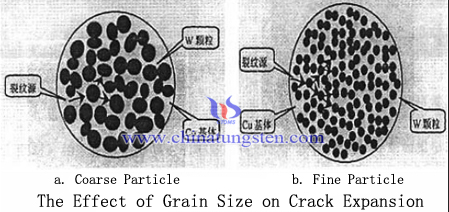Effect of Powder Property on Tungsten Copper Electrode Density (1 of 2)
- Details
- Category: Tungsten Information
- Published on Friday, 08 January 2016 17:00
Too fine granularity of tungsten powder has bad heat shock resistance, it is easily to produce cracks when arcing, which decreases the hardness and the density of contacts and increases the resistivity. In addition, in the electric arc, the gap at the easy to crack, copper-rich copper areas prone ablation spatter, even vaporization, forming a contact surface cavities, pits and cracks and other defects. Too coarse tungsten powder, on the one hand will decrease the contact area of tungsten powder particles, in the process of sintering tungsten framework between tungsten powder particles can not form a good bond necking, it is difficult to form a high strength tungsten skeleton. This further influenced the subsequent sintering process combined with weaker intensity tungsten framework by liquid copper erosion leaving the bonding strength further reduced, resulting in decreased tungsten copper W-Cu electrode contact material hardness.
Tungsten powder granularity has a great influence on hindering the cracks expanding. Smaller particle size tungsten powder, tungsten particles dispersed after sintering. When the micro crack copper matrix and tungsten particles, tungsten particles will encounter more, every encounter, micro crack bifurcation occurs, thereby increasing the crack propagation energy consumption. Thus, the dispersed tungsten powder can be more effectively suppressed crack propagation, the tungsten copper electrode material bonding strength has been significantly improved. On the other hand, tungsten powder particle size is too coarse, the tungsten skeleton pore becomes large, easy to cause evaporation under arcing splashing copper electrode degree of burning increases, leading to a galvanic corrosion rate is increased. It is a good way to get tungsten copper electrode material with excellent properties that use different granularity of tungsten powder matched.

| Tungsten Copper Supplier: Chinatungsten Online tungsten-copper.com | Tel.: 86 592 5129696; Fax: 86 592 5129797;Email:sales@chinatungsten.com |
| Tungsten News & Prices, 3G Version: http://3g.chinatungsten.com | Molybdenum News & Molybdenum Price: http://news.molybdenum.com.cn |